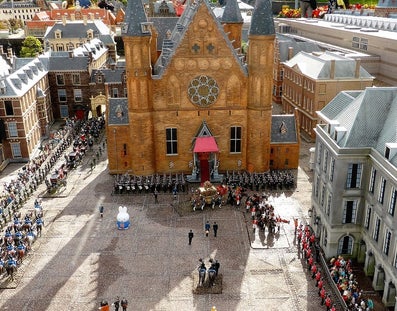Our society and democracy are under severe stress. There are alarming conflicts between international coalitions, countries and population groups. There is also indignation about transgressive behaviour, the childcare benefits scandal, the gas extraction in Groningen, unequal opportunities and the coronavirus pass. And there is agitation over administrators and government leaders who put self-interest first, abuse their power and live in an ivory tower. Trust in international expertise, government, an independent press and even the rule of law is weakening in the Netherlands and around the globe.
Due to increasing digitalisation, we live in a much more fragmented society. Citizens are organising their own associations and are looking for new ways to make their voices heard. They are served up information based on algorithms and increasingly live in their own bubble with like-minded people. On top of this, there are restrictions on freedom of the press in a number of countries. Criticism from others is often dismissed as fake news. Because of this, contradictions, mutual distrust and lack of understanding are intensified, and solutions to complex national, international and social issues seem further out of reach than ever before.
Heart for society
How can we turn the tide as a society, and once again find a healthy balance between individual freedom and collective interest? How can leaders reduce social divides between citizens, employees, patients or consumers? Which freedoms and responsibilities should be entrusted to citizens? And where is a stronger hand needed to protect the vulnerable and strengthen their position in the long term? Simply put, how can we govern with a heart for society and our fellow citizens? This question is central to education and research within the profile theme Governance for Society at VU Amsterdam.
The ambition is to realise a society in which everyone counts, participates, has equal opportunities and feels heard and represented. A society in which we share the sweet and sour equally, both economically and socially. A society in which governmental and semi-governmental agencies and organisations empathise with and respond resiliently to what is happening in our hyper-diverse society. While also ensuring that the will of the strongest or the loudest doesn’t dominate.
An inclusive, fair and secure society
VU academics and students examine, for example, how the government can restore declining confidence with a responsible tax and benefits policy. How companies can make a successful shift from profit-driven to socially-aware entrepreneurship that takes people, the environment and society into account. How healthcare can be made accessible to the most vulnerable and how the healthcare organisations involved can work together more effectively.
They also examine how local, national and international leaders can give attention to opposing voices so that every voice counts equally and no one is excluded. How the police and judicial systems can ensure that people who come into contact with them receive the right help and care. How policy makers can approach migration differently in order to make better use of the opportunities that migration offers to society. And how leaders and elected officials can combat political corruption, human rights violations and social inequality.
Working together for a better world
It is precisely hyper-diversity, with its wealth of perspectives, opinions and discussions, that ultimately makes our society strong and resilient. It ensures that we continue to build our democracy. Because democracy is not just an individual right; it requires agility and reflection from all of us. It is only through this lens that we can better understand social challenges and find solutions together. This is how we stand strong together for a better world.
